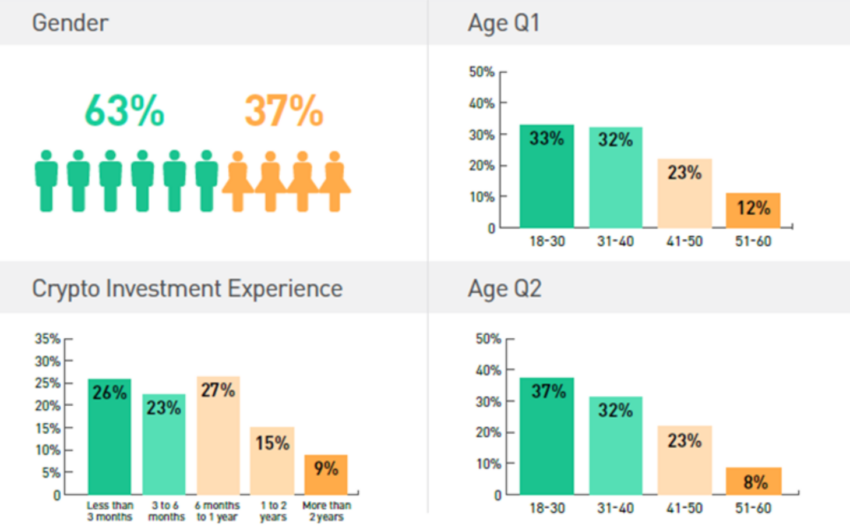
Different countries and regions are pursuing separate strategies to help drive the next crypto bull run. Herewith a list of the top five jurisdictions contributing to crypto’s growth.
Crypto regulations vary significantly by country, with some more open to the development of crypto than others. The impact of pro-crypto regulation on the global crypto market depends on several factors, including the specific regulatory measures adopted and the extent to which nations enforce them.
Nonetheless, pro-crypto regulation can provide stability and legitimacy to the market. This may lure more institutional investors and traditional financial institutions to enter the space. The added investment and adoption can help fuel a crypto bull run.
Sources of the Bull Run
As they eagerly the next crypto bull market, investors or crypto enthusiasts can’t know when it will kick off. But some believe they do know where it will originate.
Back in February, Gemini cryptocurrency exchange co-founder Cameron Winklevoss said that the next crypto bull market would come from the East. This was a reference to the fact that Asian countries have been embracing crypto, introducing sensible regulations that could result in record levels of institutional investment.
According to Chainalysis, Central and Southern Asia and Oceania (CSAO) was the third largest cryptocurrency market in its index for 2022. Citizens there benefited from $932 billion in cryptocurrency market growth from July 2021 to June 2022.
Keeping this in mind, here are five countries that could be drivers of the next bull market. Along with predictions as to when they could be passing pro-crypto regulations, and which cryptocurrencies will benefit.
United Arab Emirates (UAE)
The first country to watch is the United Arab Emirates or UAE. The UAE introduced pro-crypto regulations in 2018 when announcing its blockchain strategy in 2021. However, it wasn’t until early 2022 that the crypto industry started to migrate to Emirate cities like Dubai. That’s because the UAE announced that it would be introducing a federal license for so-called virtual asset service providers or VASPs. Including cryptocurrency exchanges.
This federal license effectively combined all the crypto licenses the country had created by that point. In the following months, there was no shortage of headlines about businesses such as international schools accepting crypto payments and government agencies dabbling in metaverses and NFTs.
The UAE Ministry of Economy set up a virtual headquarters in a custom metaverse by the end of 2022. The UAE became a home to over one and a half thousand crypto projects and companies.
Other Emirate cities, such as Abu Dhabi, announced multi-billion dollar crypto initiatives earlier this year to get in on the rush. The UAE Minister for foreign trade said that crypto would play a significant role in UAE trade. The UAE’s crypto adoption also seemed to cause a stir in other Gulf countries, such as Oman, which revealed that it would be looking to introduce crypto regulations in the coming months.
Concerns Around the “Grey” List
Now, as bullish as the UAE’s crypto adoption has been, one minor issue has stifled the realization of its potential. That is banking access.
According to UAE crypto regulation analysts, pro-crypto regulation has yet to make UAE banks more comfortable opening accounts for crypto clients. This could be because the Financial Action Task Force or FATF put the UAE on its grey list in March. Greylisted means it is harder to transact with the global banking system.
It’s not ideal for crypto projects and companies seeking to cater to international clients, and is a big part of why the UAE has taken steps to get itself off the FATF’s list. Such efforts include tightening regulations around privacy coins and demanding more information from crypto projects and companies.
These revamped crypto regulations should make UAE banks more comfortable servicing crypto clients and, with some luck, also be enough to get the UAE off the grey list.
If both outcomes occur, it may finally open the floodgates for crypto capital in the country. The only caveat is that regulations are a hurdle to crypto investing in the UAE. There continues to be uncertainty about which cryptos are allowed under Islamic Law. For context, gambling is forbidden in Islam; it’s safe to say that much crypto investing is no different from gambling.
That’s why it makes sense that the UAE is especially keen on the metaverse and NFTs. The digital property aspect of these two crypto niches makes them more palatable from an Islamic perspective. As such, metaverse and NFTs cryptos could see the most marked inflows from the UAE’s ongoing crypto adoption.
Saudi Arabia
This ties into the second country to watch: Saudi Arabia. In contrast to the UAE, the Saudi government banned banks from processing crypto-related transactions in 2018. The government also declared that crypto trading was illegal, but there are reportedly no penalties for those who trade. The absence of punishment is probably why a significant number of Saudi citizens hold and trade crypto.
According to a survey by KuCoin in May 2022, around 14% of Saudi adults had held or traded crypto in the last six months. Another 17% were interested in crypto.

Now the apparent popularity of crypto in Saudi Arabia has given rise to so-called Halal-approved crypto products, which began making headlines late last year. Around this time, the Saudi Central Bank announced that it had hired a crypto expert to assist in the country’s crypto policy.
With the emergence of Saudi Arabia’s Mega City and its possible crypto adoption, Binance already has boots on the ground in the country. This is evidence that the kingdom is seriously considering pro-crypto regulations, probably because it wants to compete with the other Gulf countries.
Further evidence lies in the unexpected announcement from earlier this year that the Saudi government had partnered with the crypto project Sandbox for metaverse development. This underscores the appeal of the metaverse and NFT niches to countries with Islamic customs and laws.
Relations With America
Although it’s still too soon to say if Saudi Arabia will adopt crypto to the extent of the UAE, geopolitics pushes the oil kingdom in that direction. As some may have heard, Saudi Arabia’s relationship with the United States is getting weaker while its relationship with China is getting stronger. Saudi Arabia is reportedly considering pricing some of its oil sales to China in yuan.
This is a big deal because Saudi Arabia is expected to price all its oil in US dollars. Pricing even just a portion of its oil in yuan would weaken the US dollar, upsetting the United States. Here’s where things get very interesting. The Saudi Riyal is pegged to the US dollar at a rate of 3.75 SAR to 1 USD. This has been the case since 1986. if Saudi Arabia were to do something to upset America, such as sell its oil in foreign currencies, Washington could retaliate by restricting Saudi Arabia’s access to USD.
The Saudi government seems to be hyper-aware of the situation. Hence, the Saudi Central Bank is weighing the development of a central bank digital currency or CBDC. A digital Saudi Riyal could allow Saudi Arabia to eliminate its currency’s dependence on the US dollar.
Late last year, Iran, another Islamic country, allowed businesses to use crypto for trade. China recently brokered a peace deal between Saudi Arabia and Iran. Iran might use crypto for trade with Saudi Arabia, making Saudis more comfortable doing the same. If Saudi Arabia does start using crypto for trade, the Gulf countries would likely follow suit. That’s because the currencies of most Gulf countries are also pegged to the US dollar.
Hong Kong
The third jurisdiction on the list is Hong Kong, which is part of China. This highlights the importance of Hong Kong’s crypto adoption. It foreshadows China doing the same. For reference, China banned crypto in 2018 and stamped out what was left of the industry in 2021. Hong Kong was initially seen as a safe haven for Chinese crypto companies and projects, but this changed after the not-so-subtle takeover of the administrative state following mass protests in 2019 and 2020.

In late 2020 Hong Kong banned retail crypto trading and cracked down on the crypto industry. In early 2022 Hong Kong started targeting stablecoins, as they could undermine a Hong Kong CBDC. The fact that the Hong Kong dollar is pegged to the US dollar suggests that Hong Kong could likewise be trying to escape US influence with a CBDC.
In mid-2022, Hong Kong officials noted that some NFTs require additional regulations. This suggests that the region may not be as open to the metaverse and NFT niches as the UAE and Saudi Arabia. This could have something to do with China’s strict control of social media and desire to maintain it.
Unlike the People’s Republic of China, officials here considered legalizing retail crypto trading and investing by the end of 2022. Hong Kong has committed to attracting over 1,000 crypto companies and projects over the next three years.
Earlier this year, Hong Kong officials specified that they wanted to restrict retail crypto investment to the largest and most liquid cryptocurrencies. This suggests that cryptos like BTC and ETH could be the biggest beneficiaries when retail crypto trading and investing become legal this summer.
Supporting the Cause
Not surprisingly, the Chinese government has signed off on Hong Kong’s crypto plans. This is an understatement, given that Chinese banks are reportedly trying to provide banking services to crypto companies and projects in Hong Kong despite crypto being illegal on the mainland. Not only that, but Hong Kong banks have also begun offering crypto-to-fiat conversions to their clients.
Arthur Hayes, the former CEO of crypto derivatives giant BitMEX, believes the next crypto bull run may start when China moves back into the market, and Hong Kong has a vital part to play in this process. However, there are caveats. Hong Kong officials appear averse to everything except crypto investing. Non-CBDC stable coins will be off-limits, and DeFi will be restricted too.
Singapore
All the above provides a segue to the fourth jurisdiction to watch, Singapore. Now, Singapore seems to have a love-hate relationship with cryptocurrency. The city-state denied hundreds of crypto licenses, banned crypto-related advertising, and even shut down crypto ATMs early last year. On the flip side, however, KPMG found that crypto investments in the tiny nation had increased by more than 13x in 2021.
Singaporean banks started expanding their services to retail investors in early 2022 and multiple large crypto companies, including Circle and Coinbase, got crypto licenses. Moreover, Singaporean companies have been exploring crypto payments, and the government explored tokenizing assets on Smart contract cryptocurrencies. Yet, between these bullish headlines, there’s been no shortage of crackdowns on the crypto industry.
Most of these crackdowns came after the collapse of the crypto hedge fund Three Arrows Capital, or 3AC, based in Singapore. Given that failure perhaps was caused by the implosion of Terra’s UST, stablecoins were among the crypto niches Singaporean regulators targeted. They also floated the idea of restricting the participation of retail investors in crypto but seem to have opted to introduce revamped crypto regulations for everyone instead.
Regulators worked on streamlining the screening process for crypto projects and companies seeking to secure bank accounts in the country. Needless to say, banking access is the biggest issue for the crypto industry, so this initiative could be very bullish.
Past Hiccups
Now there are two problems crypto could encounter in Singapore. The first is that the country experienced direct financial damage when FTX went bankrupt. This is because Singapore’s wealth fund Temasek lost around $275 million when the exchange went down. This has made Singapore skeptical of cryptocurrency exchanges in general, causing issues for Binance and others.
On the other hand, Singapore has been working closely with the Federal Reserve on a CBDC. This suggests that the country is more geopolitically aligned with the United States and is not trying to escape American influence using a CBDC as other countries seem to be doing. Which would explain why Singaporean authorities scrutinize Binance, not FTX, and why the country continues to flip-flop between accepting and rejecting crypto.
For anyone still unaware, Binance has faced much scrutiny from US regulators as of late, as has the rest of the crypto industry. This means Singapore’s impact on the crypto market could go either way. It could be positive if the country decides to compete with its neighbors on crypto regulations, but very harmful if the country chooses to follow in the footsteps of the United States.
France
The last country to watch is a wild card: France. At a glance, France is becoming the most crypto-friendly country in Europe outside Switzerland and possibly the most crypto-friendly in the West.
Since President Emmanuel Macron’s re-election in April last year, an avalanche of pro-crypto news has come out of France. For starters, Binance secured a digital asset registration in the country last May. This was a big deal because Binance has faced much scrutiny elsewhere in Europe. Last September, one of France’s largest banks began offering crypto custody services to institutional investors and then secured the same digital asset registration as Binance to provide even more crypto services.
This came as US banks started facing scrutiny for doing the same. Earlier this year, Binance partnered with a French company to test crypto payments in the country.

French regulators also announced that they would be revamping and introducing better crypto regulations. This is noteworthy because the EU is working on its crypto rules, and France is a front-runner. As an added plus, USDC stablecoin issuer Circle chose France to host its European headquarters.
Across the Region
Considering that Circle knows crypto regulations everywhere and has the money to set up anywhere, choosing France confirms that the country is highly pro-crypto. France’s stance seems to be an extension of the EU’s sentiment and the continent’s attempts to keep up economic growth in the face of terrible obstacles.
But again, France has faced pressure from other countries in the EU. If it goes down this pro-crypto path, this could even result in punishments.
Still, if France continues to go against the grain, it could inspire other countries to do the same, and not just in Europe. French is one of the world’s most widely spoken languages. More importantly, it’s spoken in many African and Middle Eastern countries actively trying to escape the US Dollar. It would be easy for such countries to follow in France’s footsteps.
Disclaimer
Following the Trust Project guidelines, this feature article presents opinions and perspectives from industry experts or individuals. BeInCrypto is dedicated to transparent reporting, but the views expressed in this article do not necessarily reflect those of BeInCrypto or its staff. Readers should verify information independently and consult with a professional before making decisions based on this content.






